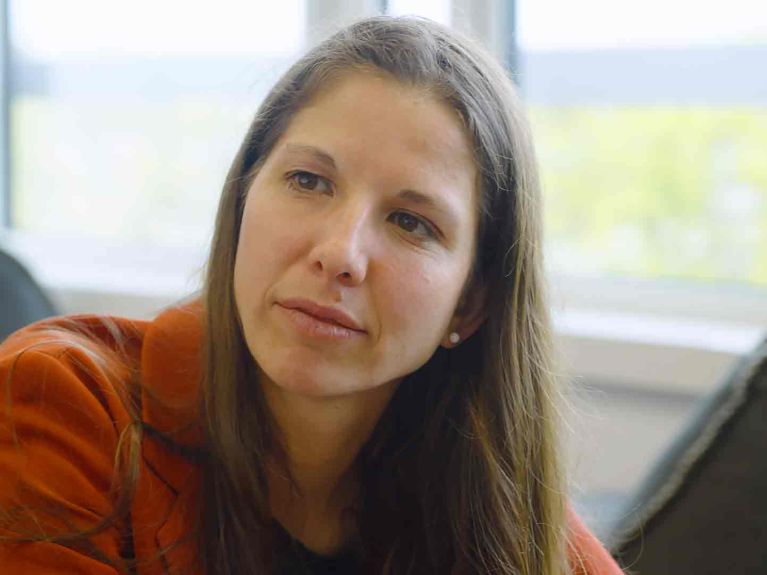Rethinking mobility
Johanna Kardel is helping facilitate the switch to sustainable transport solutions - by expanding the charging infrastructure for electric cars.

People who want to contribute to the energy transition in response to the climate crisis: We introduce individuals whose ideas and commitment are driving the expansion of renewable energies in Germany and around the world..
“I’m convinced that our roads will be quite unrecognisable to us,” says Johanna Kardel when asked about transport in Germany in the year 2050. Thanks to her job, she herself finds it easy to imagine this mobile future: In her mind’s eye she envisages “lots of public transport and bicycles, sharing the streets with electric driverless private cars”. Furthermore, renewable energies such as solar power will be produced all over the place, both on and next to roads. To turn this vision into reality, Johanna Kardel works hard every day at the electric mobility firm Elli.
Dieses YouTube-Video kann in einem neuen Tab abgespielt werden
YouTube öffnenThird party content
We use YouTube to embed content that may collect data about your activity. Please review the details and accept the service to see this content.
Open consent formAfter all, time is running out. Currently, transport is one of the sectors that produces the most greenhouse gases in Germany. In 2022, it was to blame for roughly a fifth of all emissions. And the goal is to drastically reduce emissions in the next few years: By 2030, Germany aims to reduce its emissions of greenhouse gases by 40% compared to 2020 levels. According to the Climate Change Act, the country is to become climate-neutral by 2045 at the latest. Among other things, this will involve a “transport transition”, i.e. a switch to sustainable mobility.
Mobility is a basic need for all of us.
“Mobility is a basic need for all of us,” says Kardel, who travelled to Elli’s Munich offices by underground this morning. “Obviously that’s not possible everywhere, and especially in rural regions electric mobility is therefore an important factor.” Germany has ambitious and clearly defined targets in this area, too: By 2030, the country is to have at least 15 million fully electric cars on its roads. The figure is currently around one million. To accelerate the transition, anyone who buys an electric car will qualify for a so-called environmental bonus. Furthermore, the German government is funding research into battery manufacture and the establishment of production facilities in Germany.
Simply making the right vehicles and the right engine types available is not enough, however - the transport transition also requires the charging infrastructure, both public and private, to be expanded. This is where Johanna Kardel and her colleagues at Elli come in. A Volkswagen subsidiary, Elli sells a charger for home use. Hardly bigger than a shoebox, the inconspicuous device can be attached to the garage wall, for example. The company also has an app that allows users to access more than 500,000 public charging stations of different providers in Europe.
Johanna Kardel is responsible for regulatory questions - after all, visions only become a reality if someone takes care of the small print and legal issues. After graduating with a master’s degree in European studies, Kardel worked in a variety of jobs concerned with renewable energies and law. At the Federation of German Consumer Organisations for example, she worked to ensure that new energy laws gave sufficient consideration to the interests of citizens.
A lot still needs to be done, but that’s what makes my work so exciting.
She has worked at Elli for one and a half years now, studying draft laws to ascertain what significance they will have for electric mobility and the energy transition in practice. “Furthermore, I keep my colleagues up to speed with the legal frameworks for new products.” The young woman also supervises pilot and research projects that Elli runs together with grid operators, universities and foundations. “I work at the interface between technology and regulation.”
Kardel believes it is important to think big when it comes to the transport transition. Electric cars shouldn’t only consume electricity, they should also be able to store it and release any surplus energy. A roundabout rather than a one-way street – or “bidirectional charging,” as the expert calls it. To this end, Kardel’s employer offers not only its chargers and the app, but also supplies green electricity - both for cars and any other forms of domestic consumption. Electric cars are to become part of the energy system. “A lot still needs to be done to make this happen,” says Kardel, “but that’s just what makes my work so exciting.”






